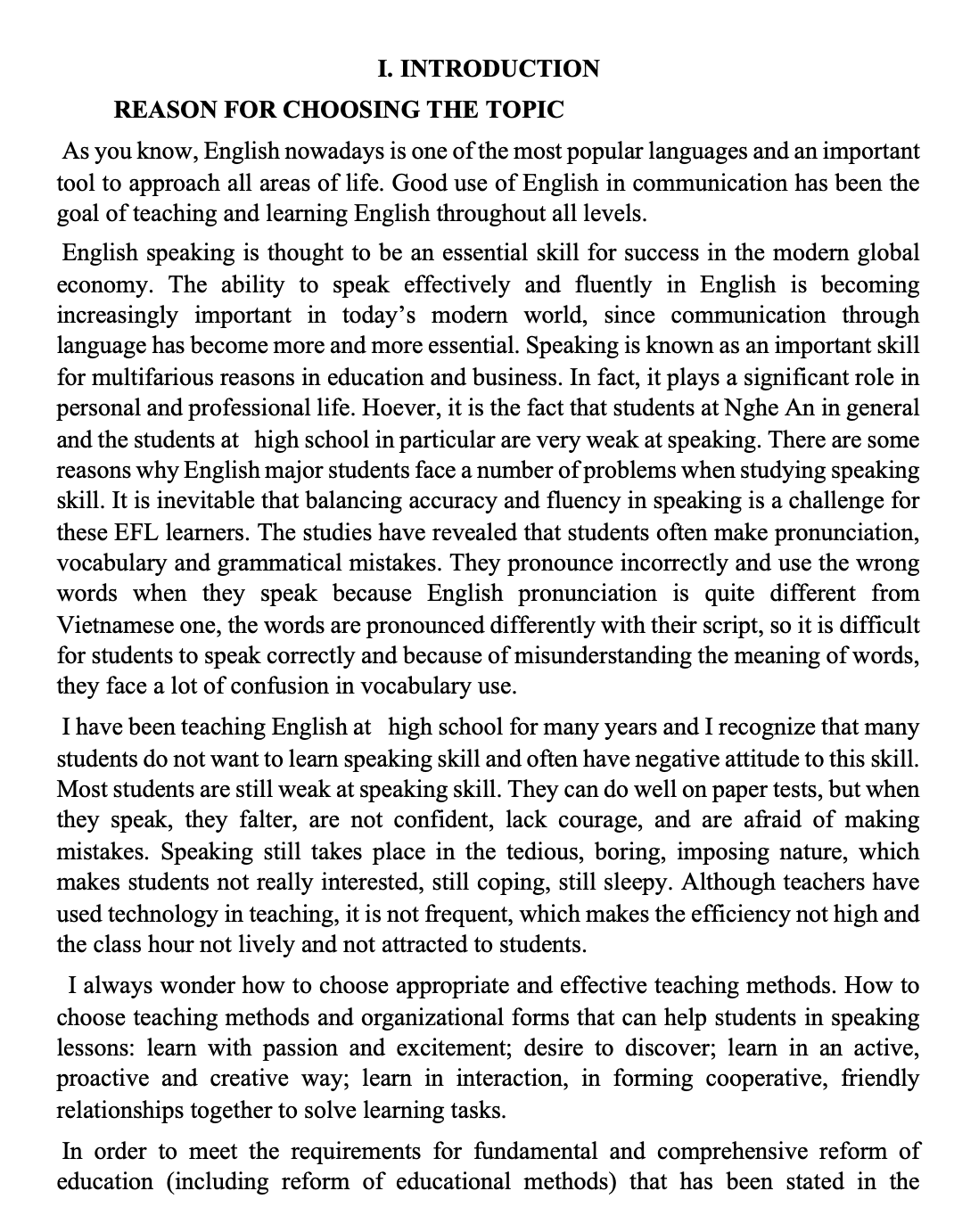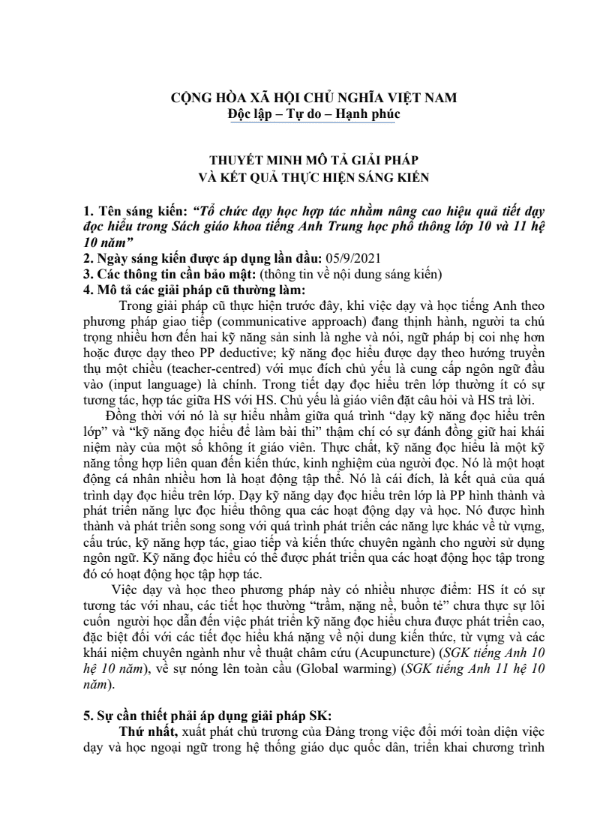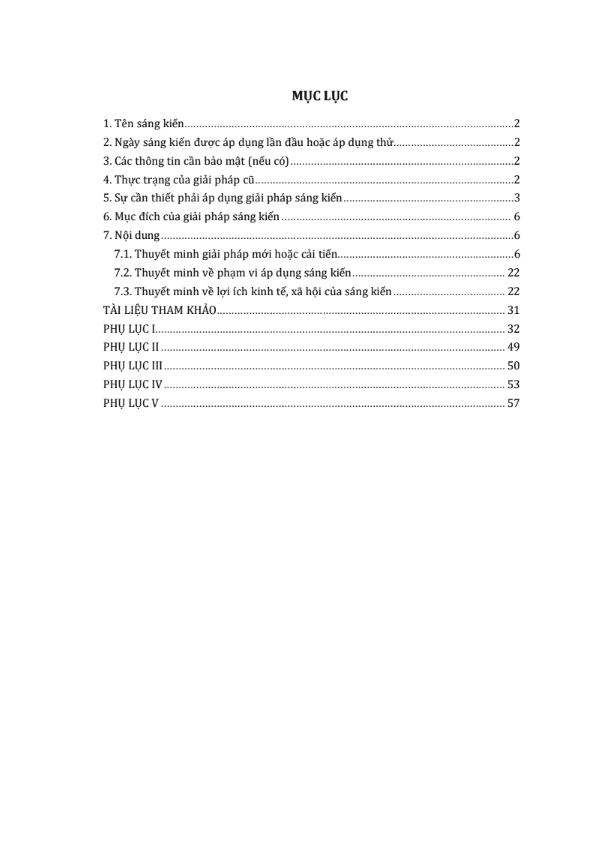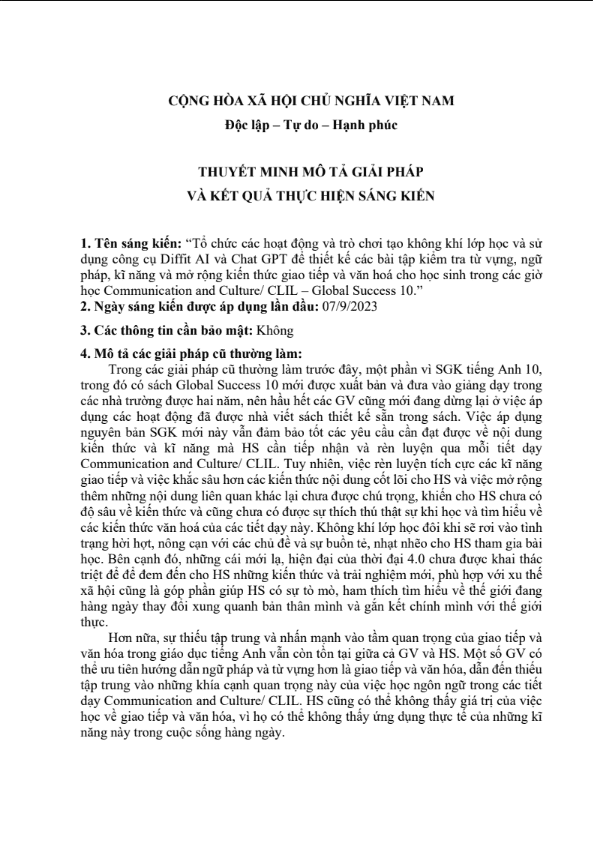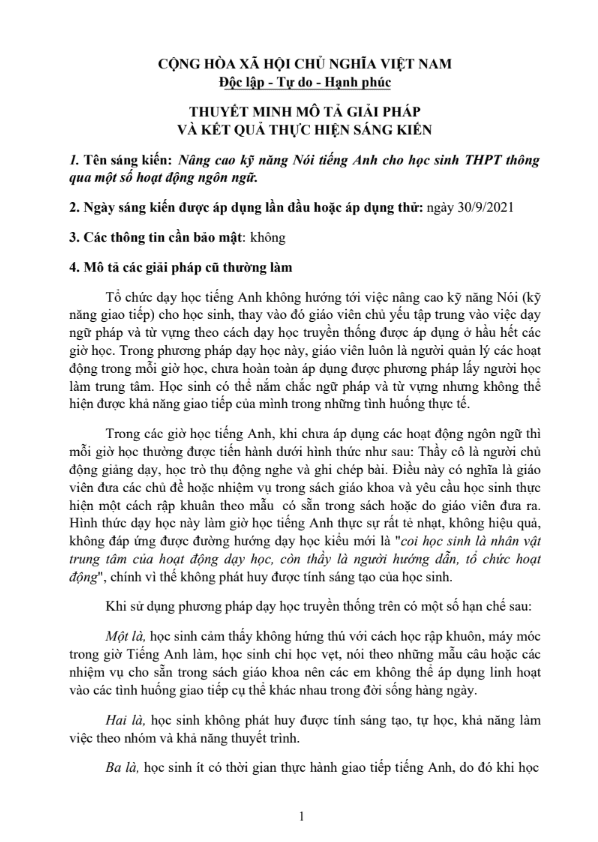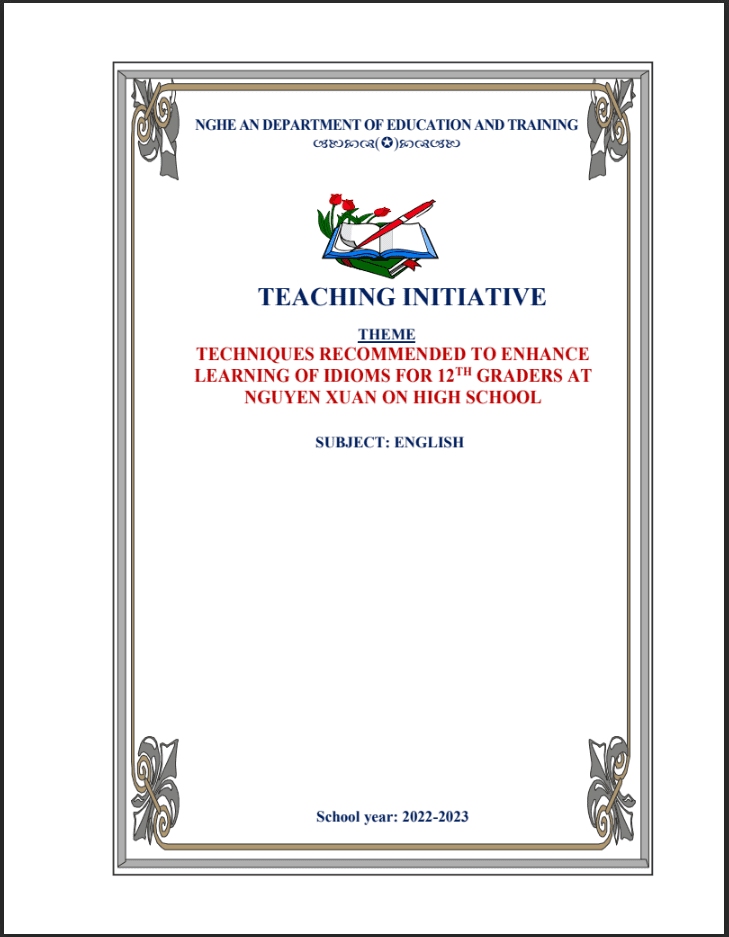SKKN Motivating and enhancing students’ English speaking ability by applying small group projects at home
- Mã tài liệu: MP0069 Copy
| Môn: | Tiếng anh |
| Lớp: | 10, 11, 12 |
| Bộ sách: | |
| Lượt xem: | 416 |
| Lượt tải: | 3 |
| Số trang: | 62 |
| Tác giả: | Phạm Thị Ngọc Anh |
| Trình độ chuyên môn: | Cử nhân đại học |
| Đơn vị công tác: | THPT Quỳ Hợp 2 |
| Năm viết: | 2021-2022 |
| Số trang: | 62 |
| Tác giả: | Phạm Thị Ngọc Anh |
| Trình độ chuyên môn: | Cử nhân đại học |
| Đơn vị công tác: | THPT Quỳ Hợp 2 |
| Năm viết: | 2021-2022 |
Sáng kiến kinh nghiệm “SKKN Motivating and enhancing students’ English speaking ability by applying small group projects at home” triển khai gồm các biện pháp nổi bật sau:
– Introduction
– Divide class into groups and select the sub-topics of the project
– Conduct the project
– Present the final outcomes of the project
– Assess students’ work
– Give key values
Mô tả sản phẩm
I. INTRODUCTION
REASON FOR CHOOSING THE TOPIC
As you know, English nowadays is one of the most popular languages and an important tool to approach all areas of life. Good use of English in communication has been the goal of teaching and learning English throughout all levels.
English speaking is thought to be an essential skill for success in the modern global economy. The ability to speak effectively and fluently in English is becoming increasingly important in today’s modern world, since communication through language has become more and more essential. Speaking is known as an important skill for multifarious reasons in education and business. In fact, it plays a significant role in personal and professional life. Hoever, it is the fact that students at Nghe An in general and the students at Quy Hop 2 high school in particular are very weak at speaking. There are some reasons why English major students face a number of problems when studying speaking skill. It is inevitable that balancing accuracy and fluency in speaking is a challenge for these EFL learners. The studies have revealed that students often make pronunciation, vocabulary and grammatical mistakes. They pronounce incorrectly and use the wrong words when they speak because English pronunciation is quite different from Vietnamese one, the words are pronounced differently with their script, so it is difficult for students to speak correctly and because of misunderstanding the meaning of words, they face a lot of confusion in vocabulary use.
I have been teaching English at Quy Hop 2 high school for many years and I recognize that many students do not want to learn speaking skill and often have negative attitude to this skill. Most students are still weak at speaking skill. They can do well on paper tests, but when they speak, they falter, are not confident, lack courage, and are afraid of making mistakes. Speaking still takes place in the tedious, boring, imposing nature, which makes students not really interested, still coping, still sleepy. Although teachers have used technology in teaching, it is not frequent, which makes the efficiency not high and the class hour not lively and not attracted to students.
I always wonder how to choose appropriate and effective teaching methods. How to choose teaching methods and organizational forms that can help students in speaking lessons: learn with passion and excitement; desire to discover; learn in an active, proactive and creative way; learn in interaction, in forming cooperative, friendly relationships together to solve learning tasks.
In order to meet the requirements for fundamental and comprehensive reform of education (including reform of educational methods) that has been stated in the resolutions of the Party, State and Government. That is Resolution No. 29-NQ/TW, which was dated November 4, 2013 of the 8th Central Conference of the XI term on fundamental and comprehensive reform of education and training, based on the goals and viewpoints of program development under the General Education Program and the General Education Program in English (2018), I boldly propose a measure: “Motivating and enhancing students’ English speaking ability by applying small group projects at home” with the main goal of motivating students, and helping students practice and improve their English speaking ability, which is based on:
- Creating opportunities and environments for students to practice speaking English more.
- Practicing self-study and self-study methods, thereby giving students a much more personalized and rewarding experience on the topic, students are not limited to information, vocabulary or grammar introduced in a text taken from a textbook. Students have the freedom to view the topic from different aspects and thus be exposed to and practice the English language they have learned in class. As they delve deeper into a topic, they not only listen to different people’s opinions on the topic, but also learn how to talk about it.
- Helping students learn actively, mobilize all students to participate and promote students’ initiative and creativity, from which they have a positive interest in English and contribute to improving students’ English speaking ability.
- RESEARCH CONTENT PART 1: THEORETIC AND PRACTICAL BACKGROUND
- What is speaking skill?
Speaking skill is one of the most important skills that have to be mastered by students in learning English, as it allows us to communicate with others and express our thoughts and feelings. Speaking skill can be separated into formal and informal speaking skill, and we use both types of speaking skill in a variety of contexts throughout life.
There are some definitions of speaking skill below, such as; according to Richard (2008; 19) states that in speaking we tend to be getting something done, exploring ideas, working out some aspects of the world, or simply being together. If the students can speak English fluently that can help them to easy communicate and also explore their idea. Speaking English well also helps students to access up-to-date information in fields including science, technology and health and so on.
According to (Cameron, 2001: 40; Brown, 2004: 140) Speaking is a productive skill in the organs of speech to express meaning which can be directly and empirically observed.
There are many various aspects of speaking skill. Based on the Brown (2001:268) proposed four aspects of speaking skill namely fluency, accuracy, pronunciation, and vocabulary.
Additionally, others stated four elements of speaking skill such as Vocabulary, Grammar, Pronunciation, and Fluency.
According to Ladouse (1991) speaking is described as the activity as the ability to express oneself in the situation, or the activity to report acts, or situation in precise words or the ability to converse or to express a sequence of ideas fluently.
Speaking skill is the skill of using sound to express one’s thoughts, opinions and words for the purpose of expressing opinions, conversing and communicating with listeners. Through a conversation, the speaker and the listener exchange information with each other. According to Florez (1999: 98), speaking is an interactive process by which learners produce information and absorb information to create meaning.
The National Curriculum states that spoken language is a crucial part of learning English in schools. Throughout school, students will learn to:
- Listen and respond to teachers and classmates
- Build their vocabulary
TÀI LIỆU LIÊN QUAN
- 7
- 105
- 1
- [product_views]
- 5
- 173
- 2
- [product_views]
- 4
- 165
- 3
- [product_views]
- 4
- 129
- 4
- [product_views]
100.000 ₫
- 6
- 434
- 5
- [product_views]
100.000 ₫
- 2
- 507
- 6
- [product_views]
100.000 ₫
- 9
- 546
- 7
- [product_views]
100.000 ₫
- 4
- 409
- 8
- [product_views]
100.000 ₫
- 2
- 595
- 9
- [product_views]
100.000 ₫
- 0
- 538
- 10
- [product_views]

